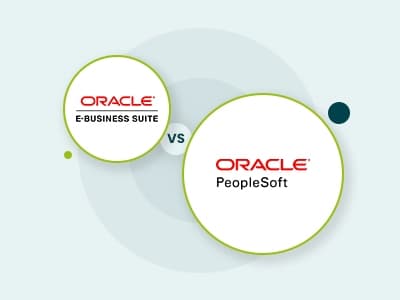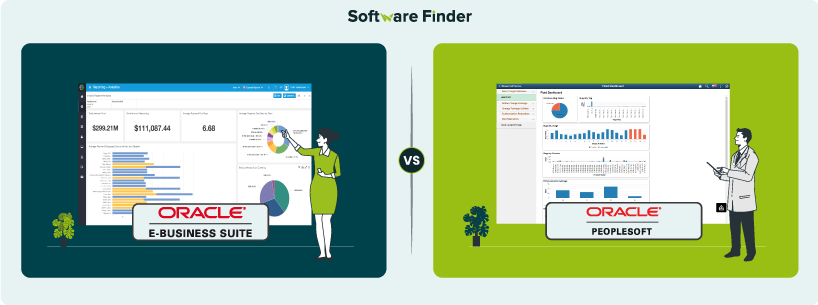
There’s a reason businesses still debate Oracle E-Business Suite vs. PeopleSoft, even though both are owned by Oracle: they serve different needs, and choosing the wrong one can slow down your operations. According to Gartner, more than 70% of recently implemented enterprise resource planning (ERP) initiatives will fail to fully meet their original business goals by 2027. One major reason behind this is the misalignment between ERP strategies and overall business objectives, which affects 75% of organizations. To prevent this, it’s important to compare both platforms before making a decision.
Oracle E-Business Suite suits companies managing real-world operations like manufacturing and supply chains, where real-time control is critical. PeopleSoft, meanwhile, fits institutions with complex workflows and compliance needs, such as universities and government agencies.
This guide breaks down the core differences between Oracle E-Business Suite and PeopleSoft—features, pros and cons, and where each platform performs best. Let's get started!
Features | Oracle E-Business Suite | PeopleSoft |
Financial Management | Offers advanced tools like Subledger Accounting and global tax compliance via E-Business Tax | Strong in budgeting, grants, and project costing with Commitment Control |
Human Capital Management | Built-in HR Command Centers, real-time dashboards, and integration with finance/supply chain | Fluid UI, Profile Management, Pivot Grids, and strong customization with PeopleTools |
Order Management | Global Order Promising, advanced pricing, and product configurator for complex fulfillment | Strong internal controls, alternate sourcing, VAT compliance, and cross-unit order processing |
Inventory Management | Supports all inventory types, including product genealogy and consigned inventory management | Focuses on warehouse layout mapping, automation, and guided WorkCenters |
Pricing | $4,595 per user (one-time) + ~$1,010 annual support | $185–$225 per employee (one-time) or $85–$185/month (cloud subscription) |
Oracle E-Business Suite (EBS) is an ERP system built for large businesses that need to manage complex operations across departments—like finance, supply chain, HR, procurement, and more. It’s especially relevant for companies operating across multiple locations, business units, or regions that need centralized control over internal processes and compliance.
Many organizations, including Panasonic Electric Works India and Galileo, have used this system to streamline manufacturing, logistics, and financial operations at scale. EBS is often chosen by enterprises that need reliable, on-premises ERP capabilities and want deep control over core business functions without relying on multiple disconnected systems.
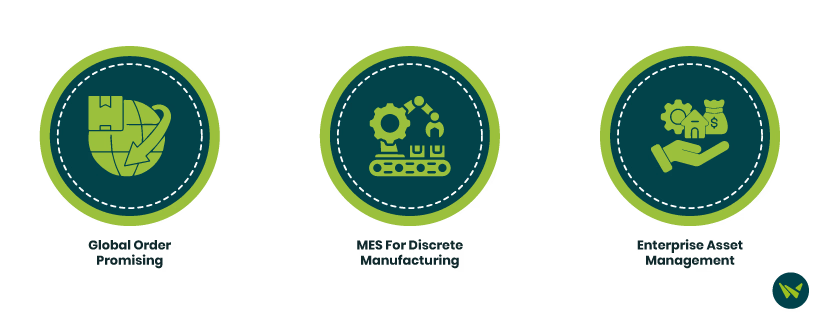
- Global Order Promising (GOP): This feature helps you give customers accurate delivery dates by checking real-time inventory, supply chain, and production schedules. It uses smart logic like Available-to-Promise (ATP) and Capable-to-Promise (CTP) to decide whether you can fulfill an order and when
- MES For Discrete Manufacturing: Manufacturing Execution System (MES) gives your production team real-time visibility into shop floor operations, helping manufacturers track production status, employee activity, yield, and scrap as work happens
- Enterprise Asset Management: The software includes modules for managing enterprise assets, covering maintenance, asset tracking, and lifecycle management. These capabilities are crucial for organizations with significant physical assets
Pros
- Supports global operations with multi-currency and tax compliance
- Improves invoicing accuracy by linking related modules automatically
- Provides visibility into credit limits and payment histories for better risk control
Cons
- Export options are limited (only basic file types like CSV are supported)
- Some users feel the system is outdated and needs new features update
PeopleSoft is an enterprise software platform developed by Oracle, known for helping large organizations manage core functions like HR, finance, and student information systems. It’s ideal in industries like education, government, and healthcare for managing complex, regulated, and data-driven operations.
One organization that put this into action is Thapar Institute of Engineering & Technology, a major Indian university with 13,000+ students. It faced issues with scattered data and manual processes that slowed service delivery. After adopting the PeopleSoft Campus Solution, they centralized student data, automated key processes, and gained real-time visibility into enrollment, academics, and finances. This improved both internal efficiency and student experience.
For universities, public institutions, or large enterprises needing control and customizable workflows, PeopleSoft is a reliable long-term solution.
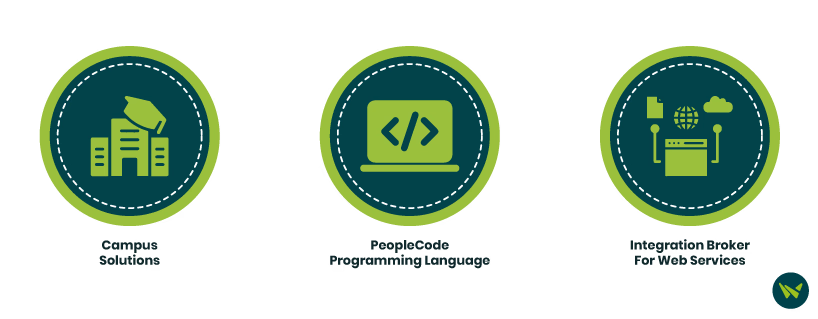
- Campus Solutions: This module is designed specifically for higher education institutions, facilitating the management of student administration functions such as admissions, enrollment, academic records, and financial aid
- PeopleCode Programming Language: PeopleSoft employs PeopleCode, an object-oriented programming language designed for the customization and extension of PeopleSoft applications. This language allows for the implementation of complex business logic and processes within the PeopleSoft environment
- Integration Broker For Web Services: The software features Integration Broker, a middleware component that facilitates real-time and batch integrations with external systems using web services. It supports Simple Object Access Protocol (SOAP), enabling seamless data exchange
Pros
- Users can work on journals within Excel and sync them to the system
- Offers animated icons and step-by-step benefit enrollment guidance
- Helps generate expense reports and fund equity reports effectively
Cons
- It can be overwhelming to navigate due to the number of modules and inconsistent user interface design
- No built-in email functionality for records; users must export files and email them separately
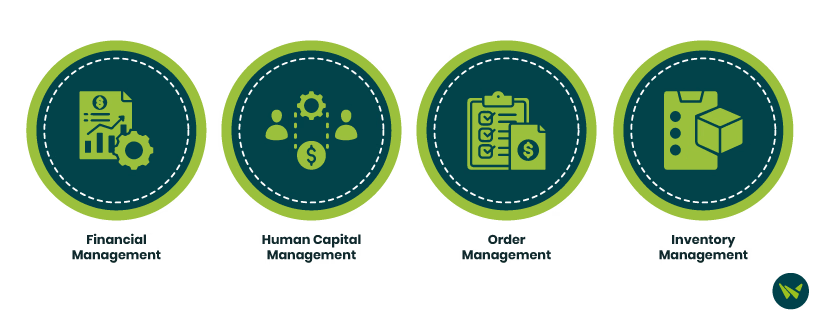

Oracle E-Business Suite is usually sold as a one-time license per user, plus a yearly support fee. Its pricing is modular and each module (like Inventory or Order Management) costs around:
- One-Time Cost Per User: $4,595
- Yearly Support Fee Per User: About $1,010.90
This means you pay once to own the software, then pay support every year (for updates, customer help, etc.).
PeopleSoft is also usually sold as a one-time license per employee, plus a yearly support fee. However, it also offers a monthly subscription option for cloud deployments.
- HR Module: $185 per employee (one-time license)
- Payroll Module: $225 per employee (one-time license)
- Yearly Support Fee: Around $40–$50 per employee
If you choose the cloud version, you won’t pay any upfront license fees—just a monthly subscription. Estimates suggest that for cloud deployments, modules like Benefits and Pension Administration start at around $85 per user per month, while Human Resources modules can start at $185 per user per month.
Disclaimer: The pricing has been sourced from third-party websites and is subject to change.
With one win each and two sections ending in a tie, this comparison ends in a draw—but the better fit depends entirely on your business type and priorities.
Choose Oracle E-Business Suite if you run a product-based company with supply chain operations, discrete manufacturing, or global logistics. On the other hand, PeopleSoft makes more sense for universities, government entities, and large enterprises that need deep HR capabilities, budget control, and compliance-first workflows.
If neither feels like a perfect match, head over to our resource center for more comparisons.
